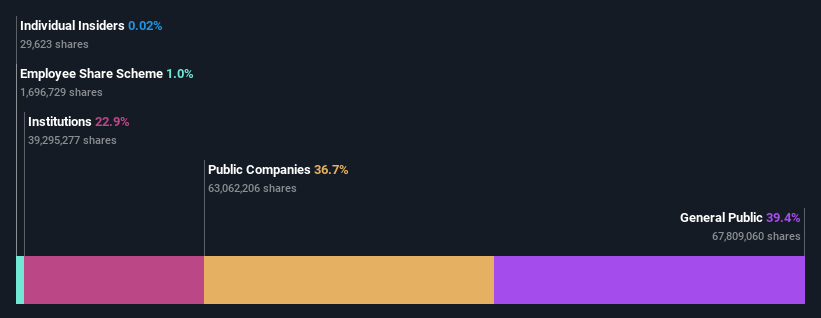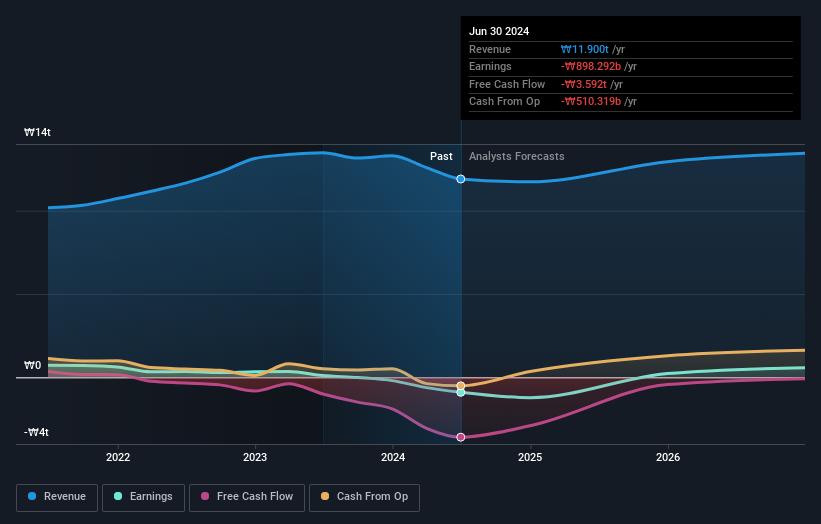- South Korea
- /
- Chemicals
- /
- KOSE:A009830
Hanwha Solutions Corporation's (KRX:009830) stock price dropped 19% last week; individual investors would not be happy

Key Insights
- The considerable ownership by individual investors in Hanwha Solutions indicates that they collectively have a greater say in management and business strategy
- The top 4 shareholders own 51% of the company
- 23% of Hanwha Solutions is held by Institutions
Every investor in Hanwha Solutions Corporation (KRX:009830) should be aware of the most powerful shareholder groups. And the group that holds the biggest piece of the pie are individual investors with 39% ownership. Put another way, the group faces the maximum upside potential (or downside risk).
As market cap fell to ₩3.0t last week, individual investors would have faced the highest losses than any other shareholder groups of the company.
In the chart below, we zoom in on the different ownership groups of Hanwha Solutions.
View our latest analysis for Hanwha Solutions

What Does The Institutional Ownership Tell Us About Hanwha Solutions?
Many institutions measure their performance against an index that approximates the local market. So they usually pay more attention to companies that are included in major indices.
We can see that Hanwha Solutions does have institutional investors; and they hold a good portion of the company's stock. This can indicate that the company has a certain degree of credibility in the investment community. However, it is best to be wary of relying on the supposed validation that comes with institutional investors. They too, get it wrong sometimes. If multiple institutions change their view on a stock at the same time, you could see the share price drop fast. It's therefore worth looking at Hanwha Solutions' earnings history below. Of course, the future is what really matters.

We note that hedge funds don't have a meaningful investment in Hanwha Solutions. Looking at our data, we can see that the largest shareholder is Hanwha Corporation with 37% of shares outstanding. For context, the second largest shareholder holds about 6.9% of the shares outstanding, followed by an ownership of 5.3% by the third-largest shareholder.
On looking further, we found that 51% of the shares are owned by the top 4 shareholders. In other words, these shareholders have a meaningful say in the decisions of the company.
Researching institutional ownership is a good way to gauge and filter a stock's expected performance. The same can be achieved by studying analyst sentiments. There are plenty of analysts covering the stock, so it might be worth seeing what they are forecasting, too.
Insider Ownership Of Hanwha Solutions
The definition of company insiders can be subjective and does vary between jurisdictions. Our data reflects individual insiders, capturing board members at the very least. Management ultimately answers to the board. However, it is not uncommon for managers to be executive board members, especially if they are a founder or the CEO.
I generally consider insider ownership to be a good thing. However, on some occasions it makes it more difficult for other shareholders to hold the board accountable for decisions.
Our data suggests that insiders own under 1% of Hanwha Solutions Corporation in their own names. It is a pretty big company, so it would be possible for board members to own a meaningful interest in the company, without owning much of a proportional interest. In this case, they own around ₩524m worth of shares (at current prices). It is good to see board members owning shares, but it might be worth checking if those insiders have been buying.
General Public Ownership
With a 39% ownership, the general public, mostly comprising of individual investors, have some degree of sway over Hanwha Solutions. This size of ownership, while considerable, may not be enough to change company policy if the decision is not in sync with other large shareholders.
Public Company Ownership
Public companies currently own 37% of Hanwha Solutions stock. It's hard to say for sure but this suggests they have entwined business interests. This might be a strategic stake, so it's worth watching this space for changes in ownership.
Next Steps:
While it is well worth considering the different groups that own a company, there are other factors that are even more important. Consider risks, for instance. Every company has them, and we've spotted 2 warning signs for Hanwha Solutions you should know about.
Ultimately the future is most important. You can access this free report on analyst forecasts for the company.
NB: Figures in this article are calculated using data from the last twelve months, which refer to the 12-month period ending on the last date of the month the financial statement is dated. This may not be consistent with full year annual report figures.
Valuation is complex, but we're here to simplify it.
Discover if Hanwha Solutions might be undervalued or overvalued with our detailed analysis, featuring fair value estimates, potential risks, dividends, insider trades, and its financial condition.
Access Free AnalysisHave feedback on this article? Concerned about the content? Get in touch with us directly. Alternatively, email editorial-team (at) simplywallst.com.
This article by Simply Wall St is general in nature. We provide commentary based on historical data and analyst forecasts only using an unbiased methodology and our articles are not intended to be financial advice. It does not constitute a recommendation to buy or sell any stock, and does not take account of your objectives, or your financial situation. We aim to bring you long-term focused analysis driven by fundamental data. Note that our analysis may not factor in the latest price-sensitive company announcements or qualitative material. Simply Wall St has no position in any stocks mentioned.
About KOSE:A009830
Hanwha Solutions
Operates in the chemicals, energy solutions, and advanced materials business areas in South Korea and internationally.
Fair value with moderate growth potential.


